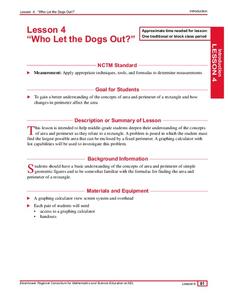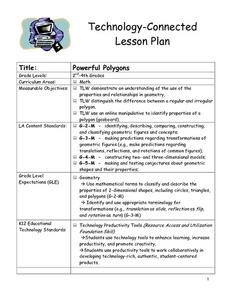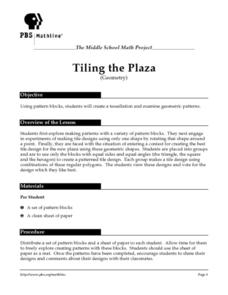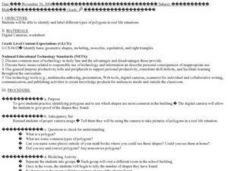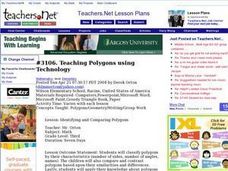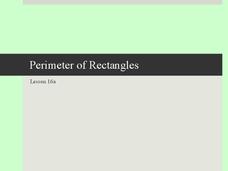Curated OER
Who Let the Dogs Out?
Students examine the concepts of area and perimeter and how they relate to a rectangle. They find the largest possible area that can be enclosed by a fixed perimeter and complete a worksheet as well as create a table of all the possible...
Curated OER
Geoboard Squares
Students create squares of different sizes on a geoboard. They find and describe a pattern. Students use the pattern to determine the number of squares possible on a 10-by-10 geoboard. They create squares with a horizontal base (and...
Curated OER
Exploring Area and Perimeter
Two students are blindfolded and each receives a cardboard square, one with pompoms glued around the edge and one with pompoms glued all over the surface. They identify what they feel. The class discusses perimeter and area of polygons....
Curated OER
Powerful Polygons
Students scan the classroom to find different common shapes. They listen as the teacher defines polygon and regular polygon. The teacher demonstrates regular polygons via the Internet and the "Math is Fun" web site. Students go outside...
Curated OER
Tiling the Plaza (Geometry)
Students make patterns with a variety of pattern blocks. Pupils experiment with making tile designs using only one shape by rotating that shape around a point. They enter a contest for creating the best tile design for the new plaza...
Curated OER
Grade 3: What Can I Make with 30 Centimeters?
Third graders create polygons with perimeters of 30 centimeters, use the centimeter grid paper to determine the area of each shape, and organize the shapes to make generalizations from the patterns they see.
Curated OER
Polygons in Real Life
Fourth graders identify and label different types of polygons in real life situations. Using a digital camera, they take pictures of polygons on the school grounds, tally the number of shapes found, and answer discussion questions.
Curated OER
The Five Number Game
Students explain what it means to square numbers. They explain what it means to cube numbers. Students define prime numbers using their own language. They are introduced to the problem by playing one game as a class.
Curated OER
They're Everywhere! They're Everywhere!
Students gain an appreciation of the polygons and polyhedrons around them that make their world one of order and strength. They build polygons and polyhedrons, and then construct airplanes out of polygons.
Curated OER
Tessellmaniacs
Seventh graders create 3 original tessellation using polygons. They slide, turn, rotate and glide their designs on the computer. They print their tessellation on a T-shirt and teach the 6th graders about tessellations.
Curated OER
Edible Geometry
Learners examine a chart that lists the main characteristics of polygons and 3 dimensional figures. They make examples of the polygons and figures using pretzels and gum drops showing how the gum drops are vertices and the pretzels are...
Curated OER
Teaching Polygons using Technology
Third graders utilize different types of computer programs, such as Microsoft paint and Microsoft Word to study and create different types of polygons. They use PowerPoint to create a story about a shape and others that it meets during a...
Curated OER
Tantalizing Tessellations Lesson III: Creating a Slide Translation
Students explore tessellations and the artwork of M.C. Escher. They view and discuss a video about M.C. Escher, create a slide template out of cardboard, and create a poster with their tessellation pattern.
Curated OER
Obtuse Angles
Third graders recognize and identify geometric shapes, work with manipulatives to reinforce understanding, and create polygons with various angles to display their knowledge of the different types of angles.
Curated OER
Two-Dimensional Geometric Shapes
Students participate in hands-on activities to explore the shapes in their environment.
Curated OER
Let's Play Mathematical Baseball
Students explore the concept of spelling geometric terms and words with number prefixes. In this spelling geometric terms and words with number prefixes lesson, students play a game of baseball. Students spell words correctly to advance...
Curated OER
Perimeter of Rectangles
Finding the perimeter of a rectangle is easy, and this presentation gives the formula that makes it so. In this short PowerPoint, learners find the perimeter of a given rectangle, after being coached on how to calculate the measurement....
Curated OER
Exploring and Classifying Polygons
Not particularly coloful, but definitely informative, here is an introductory presentation on polygons. The basic shapes are covered, from triangles to decagons. Special polygons like the trapezoid and the rhombus are also covered. Not...
Curated OER
Triangles
Students identify triangles in the real world and construct their own triangle using drinking straws. They explore abstract triangles and find additional geometric shapes such as trapezoids. Students discuss similar shapes and examine...
Curated OER
Recognize and Draw Shapes Word Problems
It's time for a geometry warm up! Geometry scholars examine a figure to determine its name from a list of four choices. The figure, a trapezoid, is large enough for the whole class to see if you were to project this. An explanation at...
Curated OER
Making Two-Dimensional Shapes
Use this introductory geometry worksheet as a projected warm-up for your class, doing it together and then revealing the explanation on the bottom half. Learners examine a square and a circle, each bisected by a dotted line. They must...
Curated OER
Rotational Symmetry
In this rotational symmetry worksheet, 10th graders identify and compare 10 different figures illustrated on the sheet. They write the order of rotational symmetry seen in each figure as compared to the others. They also define an object...
Curated OER
Right Triangles
Learners classify triangles and make connections regarding angle measurements and attributes of acute, right, and obtuse triangles. They listen to teacher define and explain triangles. Everyone imagines a place where a broken wing for a...
Curated OER
Parallel and Perpendicular Lines
Learners study parallel and perpendicular lines. In this parallel and perpendicular lesson, pupils explore 2-D shapes and determine if the sides are parallel or perpendicular.


